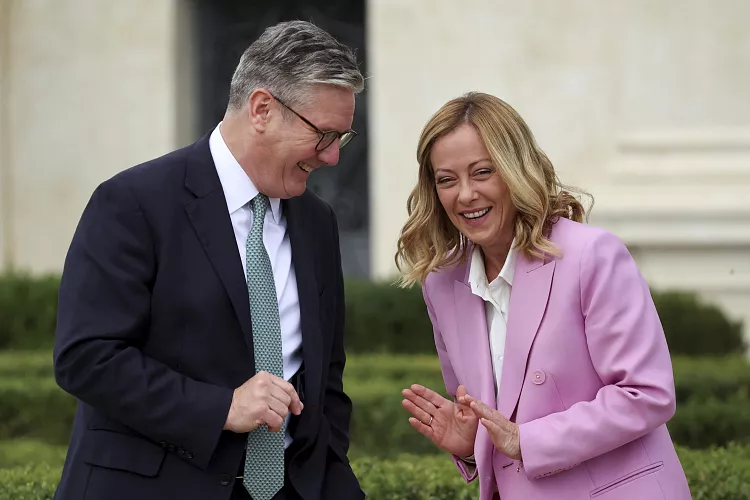British Prime Minister Keir Starmer and his Italian counterpart, Giorgia Meloni, who heads the far-right anti-immigration Brothers of Italy party, met in Rome 16 September. This meeting has sparked off a controversy as the two leaders discussed the highly sensitive and thorny issue of tackling illegal immigration. His statement, before the meeting, that he wanted to understand the methods used which have brought about dramatic reduction in migrant arrival numbers in Italy has attracted criticism from members of his own left-leaning Labour Party. Starmer also visited a national immigration coordination centre with Italy’s interior minister, Matteo Piantedosi.
Since Labour won elections in July, Starmer has promised to fight illegal immigration even while rejecting the previous Conservative government’s plan to deport asylum seekers to Rwanda. Labour MP Kim Johnson told the media it was disturbing to see Starmer “seeking to learn lessons from a neo-fascist government” of Italy. It is noteworthy that the visit came shortly after the UK was rocked by far-right riots during which mosques and migrant accommodation centres were targeted.
Already, the arrival of undocumented migrants and asylum seekers in small boats from France remains a perilous issue for Britain’s political parties. More than 22,000 people have made the dangerous crossing of the English Channel so far this year, a slight increase from the same period in 2023. Several dozen have perished, including eight killed when a boat carrying about 60 people ran aground on rocks late last week. The same day, 14 boats carrying 801 people reached Britain.
Home Secretary Yvette Cooper defended the government’s decision to seek advice from Italy’s right-wing administration with the argument that the government had “a moral imperative to make sure that we are pursuing the criminal gangs who are putting lives at risk.”
Interestingly, even though Starmer has rejected the Rwanda plan, he has not ruled out arrangements that would see asylum claims processed offshore.
Italy reached an agreement with Albania in November to host two centres where people would be housed while their asylum claims are processed. Those with rejected asylum claims would be sent back to their countries of origin whereas those with accepted applications will be granted entry into Italy.
Meloni’s government has also inked a deal with Tunisia, granting it aid in exchange for greater efforts to stop Italy-bound refugees who leave the North African country to cross the Mediterranean. Rome has also renewed a deal with the Libyan government in Tripoli dating from 2017 under which it provides training and funding to the coastguard to stem departure of refugees and return to Libya of those already at sea.
However, human rights groups have expressed grave concern pointing out that the policy pushes thousands of refugees back to Libya to face torture and abuse under arbitrary detention.
What has irked some of Starmer’s own party colleagues is his remark that he believes prevention and stopping people travelling in the first place is one of the best ways to deal with this particular issue. Since the start of the year, refugee arrivals to Italy by sea have dropped markedly, according to the Ministry of Interior. From 1 January to 13 September, a total of 44,675 people arrived compared with 125,806 for the same period in 2023.
Starmer sought to describe his plan to learn a thing or two from Italy on the immigration question for a pragmatic British approach. Whether it is Labour or Conservative, the UK government, understandably, has to be committed to strengthen the country to be a safe and secure abode for its own citizens. The ideas of humane immigration policies need a proper overhaul and thinking. This is something that has been badly missing in the British Isles in the past. Whereas Meloni’s brand of politics that fights immigration tooth and nail and discourages neighbouring nations from pushing Moslem immigrants is totally understandable.
Meloni’s radical right appears to be least bothered about criticism of its anti-immigration policy. This is borne out by the fact that she has defended Matteo Salvini who is on trial for refusing to allow an NGO boat containing 147 migrants to dock in Lampedusa in 2019. He is now a senior member of Meloni’s government. Just prior to Starmer’s trip, Prosecutors requested a six-year jail sentence for Salvini in the case. Since assuming office two years ago, Meloni has pursued the same agenda as Salvini, but with greater efficiency.
Labour is right to emphasise the need for cross-border collaboration in tackling human trafficking gangs. Western European governments are expected to also respond with compassion to the various crises in the Middle East, many of which were born out of the attitude of the same people now fleeing their own homes. The other aspect is the immigrants, once settled in their adopted country, do not modify their own habits. They are often resorting to disorderly behaviour and violence just to put their Islamist stamp on everything. This will certainly pave the way for the disintegration and destruction of everything that Europe has stood for, from the times of the Crusaders who fought Islam for 400 years.
To consider Meloni is no role model for modern day Europe may be reading the future wrong.
